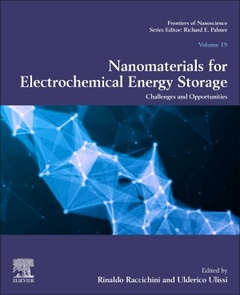Nanomaterials for Electrochemical Energy Storage Challenges and Opportunities Frontiers of Nanoscience Series
Coordonnateurs : Raccichini Rinaldo, Ulissi Ulderico

Nanomaterials for Electrochemical Energy Storage: Challenges and Opportunities, Volume Nineteen provides an objective, realistic overview on the use of nanomaterials for various rechargeable electrochemical energy storage systems. It delivers a clear message on opportunities and critical aspects for the application of nanomaterials in currently available commercial devices (i.e., lithium-ion, supercapacitors, lithium-ion capacitors) and in the most promising battery technologies (e.g., lithium-sulphur, sodium-ion, metal-air, multivalent-ion batteries, dual-ion). In addition, it covers the use of nanomaterials on two of the most promising research pathways, specifically solid electrolytes and nanostructured alkali metal interfaces. Finally, the book outlines future use scenarios in developed and industrial applications.
Nanomaterials have been considered as the ?holy grail of electrochemical energy storage during recent decades. Compounds and composites made of nanomaterials have opened unexpected research avenues, allowing entirely new classes of materials to be explored.
2. Nanomaterial aspects of Li-ion battery cathodes
3. Nanotechnology advancements for Li-ion battery anodes
4. The role of nanomaterials for supercapacitors and metal-ion hybrid capacitors
5. Progress of nanotechnology for Lithium-Sulphur batteries
6. Nanostructured materials for Sodium-ion batteries
7. Nanomaterials for metal-air batteries development
8. Application of nanotechnology in multivalent ion-based batteries
9. Contribution of nanomaterials to future electrochemical energy storage systems
10. Impact of nanostructured materials on solid state electrolytes
11. Nanostructured alkali metal interfaces for high energy batteries
12. Industrial use of nanomaterials for commercial electrochemical energy storage systems
Ulderico joined Nissan in July 2019 as Battery Research Engineer. He is the technical coordinator for research projects on next-generation battery technologies at the Nissan Technical Centre Europe.
Previously, he worked at OXIS Energy Ltd as Senior Scientist and Technical Leader for EU H2020 projects. He has published 16 peer-reviewed papers and filed 4 patents, in collaboration with several industrial partners such as BMW AG, Samsung R&D Japan, EVONIK Ind. AG, OXIS Energy Ltd. His main areas of expertise are solid-state and high energy lithium-ion batteries, with a particular focus on negative electrode materials and novel electrolyte formulations.
He was awarded his doctorate (chemistry) in 2017 from the Karlsruhe Institute of Technology (Germany). Ulderico received his BSc and MSc degrees in Industrial Chemistry from the Univer
- Covers the major nanomaterials classes used for electrochemical energy storage devices
- Assesses the major challenges of using nanomaterials for energy storage
- Shows how the use of nanomaterials can lead to lower cost and more efficient energy storage products and devices
Date de parution : 11-2021
Ouvrage de 386 p.
19x23.4 cm
Thème de Nanomaterials for Electrochemical Energy Storage :
Mots-clés :
Nanotechnology; Nanomaterials; Energy Storage; Electrochemical; Supercapacitors; Batteries



